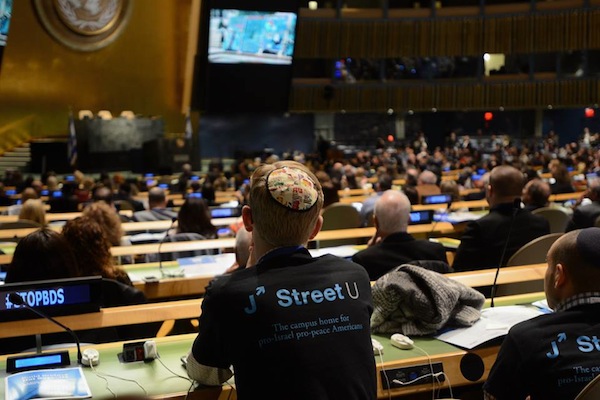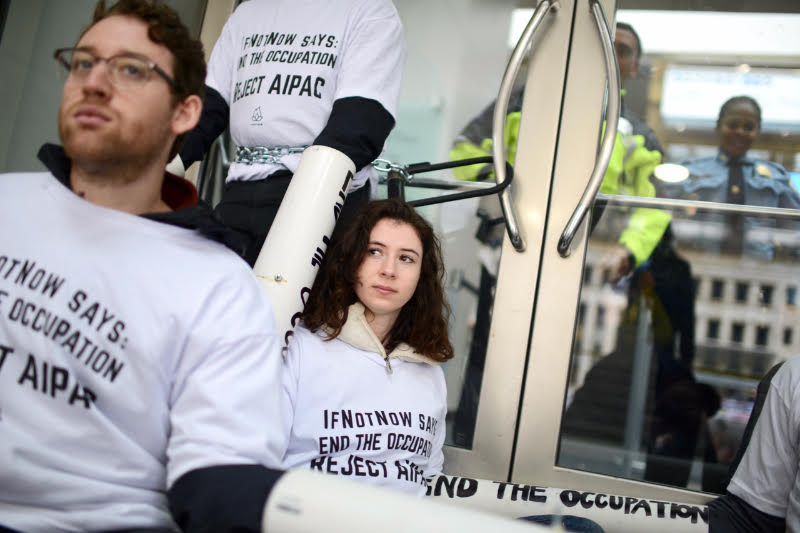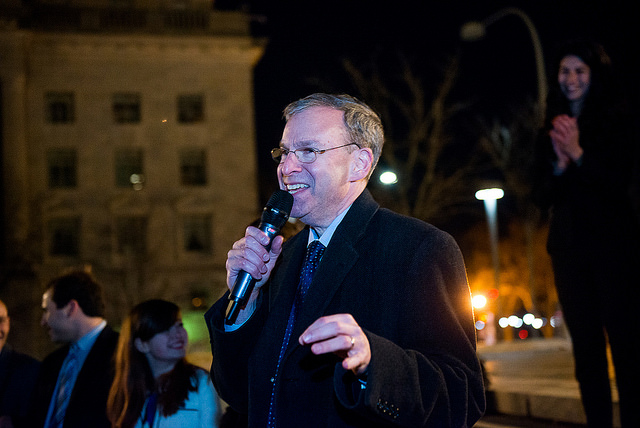After J Street U students were attacked at an anti-BDS conference this week, the lobby might want to reconsider the effectiveness of seeking common ground with extremists.

Things got ugly at an anti-BDS conference at the United Nations this week when participants turned on a group of liberal university students in attendance.
The conference, organized by the Israeli mission to the U.N., brought together many of the usual suspects working to counter the effects of the growing boycott movement. Students representing the university arm of J Street, the “pro-Israel, pro-peace lobby,” attracted the ire of the conference when they rose to ask how to counter BDS to fellow students who oppose Israel’s occupation of the Palestinian territories.
When they identified their organizational affiliation, they were met with hisses from the audience, according to a report in Haaretz. Alan Clemmons, a state legislator from South Carolina, proceeded to accuse the students of representing an anti-Semitic organization and declared, to a standing ovation, that “there is no illegal occupation.” Mort Klein, the president of the Zionist Organization of America, echoed Clemmons when he announced the “occupation is a lie.” Others called the students pigs and worse.
It’s upsetting to think of these young activists facing such hate from their community elders, and I sincerely hope someone there came to their defense, at least in private. (I’ve asked J Street whether anyone at the conference expressed support for the beleaguered students, but I haven’t heard back.) But notwithstanding its after-the-fact criticism of what transpired, I remain a bit confused as to why anyone thought it would be a good idea to send those students into what was always certain to be a lion’s den.
J Street is one of a number of American Jewish organizations that formally oppose the occupation but are not affiliated with the BDS movement. There’s nothing wrong with that – BDS detractors, the state of Israel most prominent among them, have been effective at maligning the movement as an anti-Semitic front bent on the destruction of Israel with assistance from treasonous Jews inside and outside Israel. Some groups on the left have sought distance from the movement so as not to alienate growing numbers of Jews hesitantly exploring alternatives to the establishment’s blind support for Israeli policies.
But at what point does a cautious, big tent approach reach the limits of coherence? There’s a significant difference between refraining from taking a position on BDS – the approach, for example, adopted by the young activists of IfNotNow – and joining with the Israeli government and its minions who employ increasingly authoritarian efforts to suppress it.

In the last few weeks alone, the same government that organized the New York conference passed a law barring entry to non-citizen boycott advocates, detained the head of the BDS movement (on allegations of “tax evasion”), and proposed an official database to track groups and individuals who support the movement. Yesterday, as Jewish Voice for Peace’s national conference began in Chicago, the Israeli minister tasked with intimidating boycott supporters out of existence issued a statement attacking the organization, which supports BDS, as anti-Semitic and “filled with hatred for Israel.”
As Israel’s tolerance for dissent plummets, J Street tries to articulate a constructive approach, but emerges muddled. On the day of the anti-BDS conference – no doubt anticipating scrutiny around its participation from both the right and the left – it released a statement that simultaneously opposed BDS, criticized Israel’s approach to its critics, and called for “renewed major investment in Israel’s economy and civil society without legitimizing or defending the settlements in the West Bank.” (For more on J Street’s approach, read Dahlia Scheindlin’s excellent interview with its director, Jeremy Ben-Ami.)

J Street will never succeed if it tries to be everything to everyone. The group has been excluded from a number of establishment meetings in the past, including anti-BDS events. Why does it so badly want to be at a table where it’s so clearly unwelcome?
Granted, the lobby is more concerned with being an alternative to AIPAC than an activist movement. It no doubt believes that, given the dozens of anti-BDS bills snaking through legislatures around the country, its access to political power will be blocked if it’s not on record fighting the movement. But in these polarizing times, people expect their representatives to pick a side and adhere to some ideological consistency. That doesn’t mean everyone needs to have a formal position on BDS. But seeking common ground with groups like the ZOA, who have aligned with the most extreme elements of the Trump administration, demonstrates a fundamental misreading of a political lesson we all should have learned in November.
The Israel supporters who attacked those students understand very well that the center the lobby clings to has already fallen. If it wishes to be relevant, it’s going to need an exit strategy.


